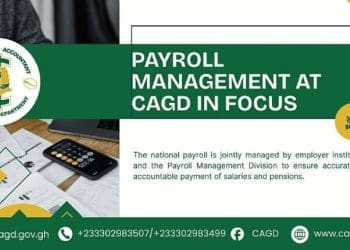A new report by the World Bank has revealed that Ghana’s economic crisis in 2022 was the inevitable outcome of years of declining revenue collection, uncontrolled government spending, mounting debt, and costly financial sector cleanup.
The report, titled “Ghana Public Finance Review Overview: Building the Foundations for a Resilient and Equitable Fiscal Policy,” traces the origins of the crisis and shows how the COVID-19 pandemic magnified pre-existing weaknesses, plunging the country into full-blown debt distress with public debt surging to 93% of GDP.
Sharp decline in revenue
At the heart of Ghana’s economic woes has been the inability to mobilise sufficient tax revenue.
Between 2017 and 2021, the country’s tax-to-GDP ratio fell from 15.7% to just 13%.
During this same period, Ghana’s average tax revenue was 13.2% of GDP—well below the sub-Saharan African average and a staggering eight percentage points below the nation’s estimated tax capacity of 21.2%.
The shortfall was particularly pronounced in income taxes and value-added tax (VAT), which bucked international trends by declining at a time when peer countries were improving collections.
Large swathes of domestic consumption remained VAT-exempt, further weakening the base.
While turnover and excise taxes showed some resilience, they were not enough to offset the collapse in broader tax revenues.
To make matters worse, the government increasingly earmarked tax revenues to statutory funds, leaving fewer resources for discretionary spending and deepening fiscal inflexibility.
Despite a decade of relatively strong economic growth, Ghana’s trajectory was built on shaky foundations.
$5,540 GDP per capita in 2019
By 2019, GDP per capita in purchasing power parity terms had risen to $5,540—65 per cent higher than in 2007.
But this growth was financed largely through external borrowing, particularly Eurobonds, rather than sustainable revenue generation.
60% Debt-to- GDP by 2019
As a result, Ghana’s public debt rose to 60% of GDP by 2019, evenly split between domestic and external liabilities.
Interest payments hits 5.5% of GDP
Interest payments also ballooned, quadrupling to 5.5% of GDP that year.
The rising cost of servicing debt crowded out vital development spending, forcing the government to borrow even more.
This vicious cycle entrenched fiscal vulnerabilities that would later prove catastrophic.
Weak expenditure controls and budget overruns
The report highlights that ineffective expenditure controls worsened Ghana’s fiscal position.
Overspending became commonplace, especially on the wage bill, while weak procurement practices undermined value for money in government contracts.
Instead of reining in spending, the government resorted to expensive international borrowing to finance deficits.
This approach might have plugged short-term financing gaps, but it left the country dangerously exposed to external shocks.
When global financial conditions tightened, Ghana’s fiscal model quickly became unsustainable.
Costly financial sector clean-up
Another factor that deepened Ghana’s fiscal challenges was the clean-up of the financial sector.
Initiated to restore stability in the banking system, the restructuring ended up costing the government the equivalent of 8.3% of cumulative GDP between 2017 and 2021.
Although deemed necessary to protect depositors and safeguard confidence in the financial system, the exercise was an expensive undertaking at a time when government revenues were already falling.
Instead of stabilising finances, it became one more drain on already strained public resources.
Ghana’s energy sector has long been plagued by inefficiencies, and the years leading to the crisis were no different.
Power sector revenue shortfalls consume 2.8% of GDP annually
Between 2019 and 2023, the government spent an average of 1.7% of GDP annually to cover revenue shortfalls in the power sector, with the figure climbing to 2.8% of GDP by 2023.
Costly take-or-pay power contracts
The deficits stemmed from high fuel costs, costly take-or-pay power contracts, distribution losses, weak revenue collection, and electricity tariffs set below cost-recovery levels.
Each of these factors steadily drained government finances, leaving the state to absorb mounting liabilities.
COVID-19 and global shocks that broke the economy
By the time COVID-19 struck in 2020, Ghana was already grappling with unsustainable deficits.
The pandemic forced the government into additional emergency spending, while global supply chain disruptions, rising commodity prices, and tighter monetary conditions in advanced economies piled on fresh pressure.
Fiscal deficits
The fiscal deficit ballooned to 14.7% of GDP in 2020, before moderating slightly to 12.1% in 2021 and 11.8% in 2022. Meanwhile, public debt surged to 93% of GDP in 2022.
Inflation soared, growth slowed, and Ghana lost access to international capital markets.
The government struggled to refinance its debt, depleted foreign reserves, and resorted to monetary financing from the Bank of Ghana, further destabilising the economy.
IMF bailout and path toward stabilisation
Faced with severe macroeconomic imbalances, Ghana turned to the International Monetary Fund (IMF) in 2022.
By 2023, the country had secured a three-year Extended Credit Facility (ECF) programme.
The bailout package included comprehensive debt restructuring, a fiscal adjustment plan, and measures to restore stability.
According to the report, Ghana’s fiscal position is now projected to improve gradually, with the government expected to post a primary surplus of 1.5% of GDP from 2025 onward.
Fiscal rules and institutional reforms
To avoid repeating past mistakes, the review stresses the need for stronger fiscal rules and institutions.
Ghana’s fiscal rule framework, suspended at the onset of COVID-19, must be revived and strengthened, the report recommends.
A combination of expenditure and debt rules—with clear escape clauses—could help promote sustainability, reduce pro-cyclical government spending, and build resilience against external shocks.
The report also highlights the importance of enhancing the independence and mandate of Ghana’s Fiscal Council to ensure accountability and discipline in managing public finances.
Ghana’s economic collapse was the product of years of structural weaknesses: declining domestic revenue mobilisation, unchecked spending, excessive borrowing, costly sectoral bailouts, and persistent inefficiencies in the energy sector.
COVID-19 and global economic turbulence merely exposed these vulnerabilities, tipping the country into a full-blown crisis.
As Ghana works its way back under an IMF-supported programme, the challenge is clear—only bold reforms and disciplined fiscal management can prevent history from repeating itself.













